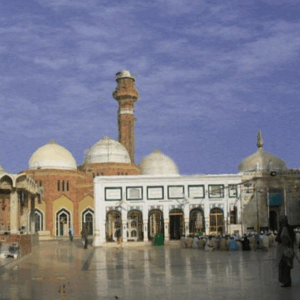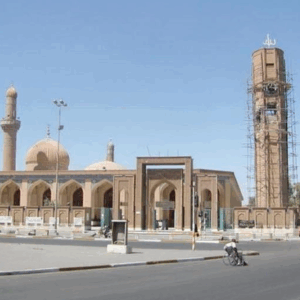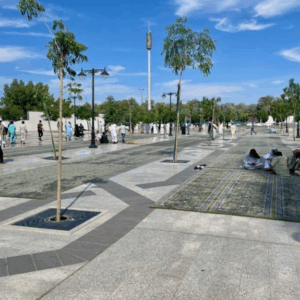Abbad ibn Bishr
It was the fourth year after the Hijrah. The city of the Prophet ﷺ was still surrounded by dangers—both internal and external. Internally, the influential Jewish tribe Banu al-Nadir violated their treaty with the Prophet ﷺ and even plotted to assassinate him, which led to their expulsion from Madinah in the month of Safar.
Two uneasy months passed. Then news reached the Prophet ﷺ that tribes from the distant region of Najd were preparing to attack. Wanting to act before they could strike, the Prophet ﷺ gathered more than four hundred companions and appointed ʿUthmān ibn ʿAffān to govern Madinah in his absence. Among those who went with him was a young Ansari companion, ʿAbbad ibn Bishr.
When the Muslims reached Najd, they found the villages strangely empty of men—only women remained, while the men had fled to the mountains. Some regrouped on higher ground, preparing for battle. As the time for Salat al-ʿAsr approached, the Prophet ﷺ feared a surprise attack during prayer. He arranged the companions in rows and performed Salat al-Khawf (the Prayer of Fear), dividing them into two groups—one praying while the other stood guard, then switching places for the second rakʿah. The discipline of the Muslims unsettled the hostile tribes, and the Prophet’s presence spread his message peacefully through the central highlands of Arabia.
On the return journey, the Prophet ﷺ camped in a valley for the night. As the companions settled their mounts, he asked, “Who will stand guard for us tonight?”
ʿAbbad ibn Bishr and ʿAmmar ibn Yasir—two companions paired as brothers after the Hijrah—volunteered.
They went to the valley entrance to stand watch. ʿAmmar was tired, so ʿAbbad told him to rest during the first half of the night while he kept watch.
The night was calm and silent. Feeling at peace, ʿAbbad decided to spend the time in worship and Qur’an recitation—something he deeply loved. He had been captivated by the Qur’an ever since he first heard the beautiful recitation of Musʿab ibn ʿUmayr in Makkah, when he was only fifteen. He became known among the companions as “the friend of the Qur’an.”
Even the Prophet ﷺ once heard him reciting in the night and asked ʿAishah, “Is that the voice of ʿAbbad ibn Bishr?” When she said yes, he prayed, “O Allah, forgive him.”
At the valley entrance, ʿAbbad began praying and reciting Surah al-Kahf in his gentle, captivating voice. Meanwhile, a man from the enemy tribes—whose wife had been taken prisoner—crept through the darkness, swearing by his idols that he would shed Muslim blood.
From a distance he saw the silhouette of ʿAbbad standing in prayer. He drew his bow and shot an arrow, which struck ʿAbbad. Calmly, ʿAbbad removed the arrow and continued reciting. A second arrow hit him, then a third. He pulled them out one by one, determined not to break his recitation.
After finishing his portion, he bowed, prostrated, and then, weak from blood loss, woke ʿAmmar. When ʿAmmar realized what had happened, he shouted the alarm and the attacker fled.
Shocked, ʿAmmar asked, “SubhanAllah! Why didn’t you wake me after the first arrow?”
ʿAbbad replied, “I was reciting verses of the Qur’an that filled my soul with awe. I did not want to interrupt them. The Prophet commanded me to memorize this surah. Death would have been easier for me than stopping my recitation.”
This devotion reflected who ʿAbbad was—deeply spiritual, courageous, generous, and passionately committed to the Qur’an. In times of danger, he was always in the front line; but when rewards were distributed, he preferred to remain unnoticed. Aishah (r.a.) once said:
“There are three Ansar whom no one can surpass in virtue: Sa’ad ibn Mu’adh, Usayd ibn Hudayr, and ʿAbbad ibn Bishr.”
ʿAbbad died a martyr at the Battle of Yamamah. Before the battle began, he sensed that his death was near. He noticed tension between the Muhajirin and Ansar and felt that they must fight in separate groups so each group’s courage and responsibility would be clear.
At dawn, as the battle raged, he stood on a mound and called out:
“O Ansar! Stand firm! Break your scabbards, and do not abandon Islam!”
His call inspired about four hundred Ansar—including Thabit ibn Qays, al-Bara’ ibn Malik, and Abu Dujanah—to gather around him. With this force, ʿAbbad led a fierce assault that pushed the enemy back to the fortified “Garden of Death.”
There, at the garden’s walls, ʿAbbad ibn Bishr fell—so badly wounded that he could hardly be recognized. He lived, fought, and died as a true believer.




